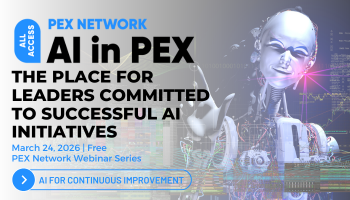4 benefits of business process management (BPM)
The top benefits of BPM are streamlining processes, enhancing business transformation, improving customer/employee experience and supporting AI adoption
Add bookmark
The top four benefits of business process management (BPM) are streamlining processes, enhancing business transformation, improving customer/employee experience and supporting artificial intelligence (AI) adoption.
That’s according to an audience poll ran during day one of All Access: BPM Business Process Management 2025.
In the opening panel of the event, Lenna Perlman from MUFG Bank, Diego Borquez from Pacific International Lines and Loai Gomaa from Procter & Gamble discussed rethinking BPM for the AI era through strategy, governance and execution.
The speakers explored what “intelligent by design” means in a modern BPM environment, examined structuring governance around rapidly evolving automation tools and outlined strategies for making BPM central to long-term value creation.
The PEX Report 2025/26 found that BPM is the most common technology organizations use to support business transformation.
Join the PEX Network community

Don't miss any news, updates or insider tips from PEX Network by getting them delivered to your inbox. Sign up to our newsletter and join our community of experts.
Learn MoreBPM reigns supreme in business transformation
As detailed in the PEX Report 2025/26, BPM is the leading technology organizations apply to support business transformation, cited by 53 percent of respondents, up significantly compared to last year (27 percent). This is ahead of business intelligence and data analytics (52 percent), AI (48 percent) and digital transformation tools (44 percent).
What’s more, 34 percent of businesses are looking to invest in BPM tools in the next 12 months, up from 22 percent last year.
“BPM works as a compass for transformation, making sure each initiative heads in the right direction,” said Borquez. “In my experience, a clear BPM framework helps identify the true value drivers – efficiency, accuracy and customer impact – and lets the organization prioritize projects accordingly: invest in what moves those metrics, postpone what merely adds complexity.”
In short, BPM provides the framework to align efforts, the lens to prioritize wisely and sets the pace to turn transformation goals into measurable business results.
BPM must evolve to align with agentic AI
However, traditional BPM must evolve to align with agentic AI. That’s a key finding from a recent research paper exploring the emergence of agentic AI and its impact on business processes.
The study, based on interviews with 22 BPM practitioners, highlights a clear message: organizations need robust governance to ensure AI agents deliver value responsibly.
Key recommendations include defining clear goals, setting legal and ethical guardrails, enabling human–agent collaboration and ensuring safe integration with fallback mechanisms.
“The rise of generative AI has sparked growing interest in its integration with software agents, giving rise to the concept of agentic AI,” the authors wrote. “While this emerging technology holds promise, its impact on business processes and the requirements for its effective management remain insufficiently understood.”
The paper outlines actions to align traditional BPM with agentic AI, including balancing human and agent roles, redefining human involvement, adapting process structures and introducing performance metrics. These insights provide a practical foundation for integrating AI agents into business processes while preserving oversight, flexibility and trust
“Agentic AI introduces new dynamics – autonomy, adaptability and self-learning – that challenge traditional BPM principles centered on structure, control and standardization,” the researchers stated. To align these approaches, organizations should take strategic steps.
All Access: AI in Process Excellence 2026

Don’t get left behind. Join us at All Access: AI in Process Excellence to learn from leading experts, thought leaders, and practitioners who are on the ground experimenting, researching, and learning how to best use AI. They will share their secrets with you for free. And you’ll have the opportunity to network with fellow professionals as we navigate this new world. Register now to save your spot.
Register Now












